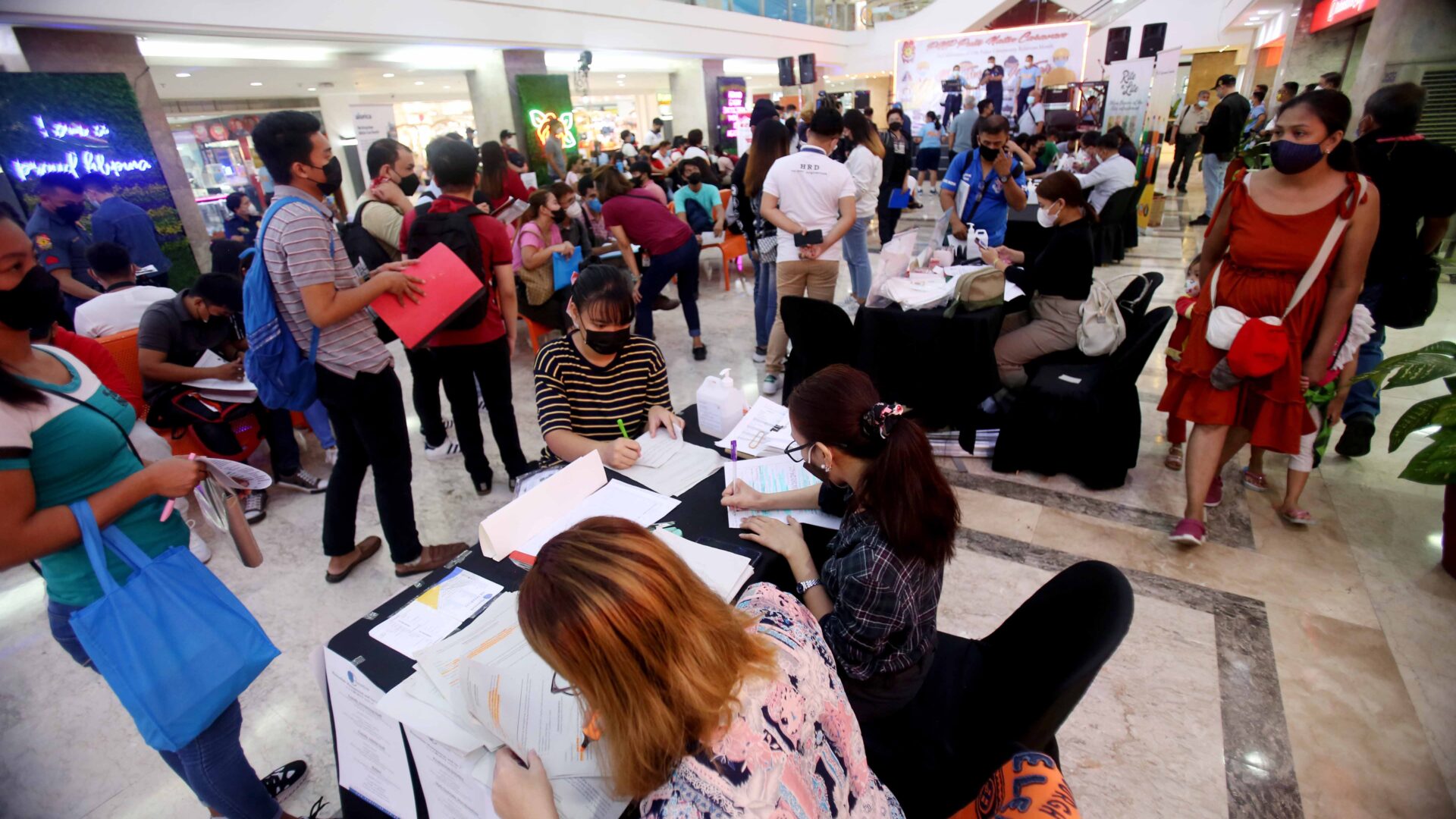The unemployment rate in June has remained unchanged at 6 percent, a welcome development for the economic sector still recovering from the effects of the ongoing Covid-19 pandemic.
The Philippine Statistics Authority (PSA) said the rate is back to pre-pandemic figure that translates to 2.99 million unemployed Filipinos out of 49.58 million who were in the labor force.
“The June 2022 unemployment rate was lower than the registered rate in June 2021 at 7.7 percent,” the PSA said.
PSA statistician Claire Dennis Mapa said the employment rate in June was at 94 percent – employed individuals surging by 508,000 compared to May’s figure. The rate was higher compared to the 92.3 percent registered in the same period of 2021.
In terms of magnitude, the PSA said 46.59 million Filipinos, who are 15 years old and above, were employed in June, higher by 508,000 compared to the 46.08 million employed in May.
The Employers Confederation of the Philippines (ECOP) attributed the unchanged unemployment rate to the endeavor made by the private sector and the government to produce one million jobs under the National Employment Recovery Strategy (NERS) launched last Labor Day, 1 May.
Apart from this, ECOP president Sergio Ortiz-Luis Jr. also cited the loosening of Covid-19 restrictions that allowed more and more citizens to move freely despite the pandemic.
“Loosened restrictions indeed helped a lot. This was accompanied by the project of ECOP, as well as the DTI (Department of Trade and Industry), DoLE (Department of Labor and Employment) BPO (Business Process Outsourcing) companies to provide 1 million jobs which we completed last March. We have launched another 1 million jobs that will be completed by the end of the year,” Ortiz-Luis told the Daily Tribune.
Last May, former Trade Secretary Ramon Lopez said the NERS project has already produced 980,000 jobs, the bulk of which generated by the construction and IT-BPM sectors and the recovering tourism and restaurant sectors.
Aside from the government agencies and ECOP, business groups that participated in the NERS project are the Philippine Chamber of Commerce and Industry, Hotel and Restaurant Association of the Philippines, Philippine Constructors Association Inc., Philippine Hotel Owners Association, Semiconductor and Electronics Industries in the Philippines Foundation Inc., IT & Business Process Association of the Philippines and the Philippine Association of Legitimate Service Contractors.
Continue opening the economy
National Economic and Development Authority (NEDA) Secretary-General Arsenio Balisacan said the country needs a safe and full reopening of the economy to return to a high-growth path and reinvigorate job creation.
“In the near term, we will prioritize the immediate issues of rising inflation, the vulnerability of certain groups to shocks, and the pandemic-induced scarring to ensure that growth and employment gains are sustained,” Balisacan said.
He added that the reopening of the economy, including the resumption of face-to-face schooling, will boost domestic activities and insulate the economy against external headwinds.
“The latest data show a significant increase in the number of workers employed on a full-time basis. While this is a good indication of the improving quality of work in our country, the government should incessantly boost its efforts towards providing an environment conducive to the creation of more and better employment opportunities,” the NEDA chief explained.
He maintained that the immediate and safe resumption of face-to-face classes is anticipated not only to increase domestic activities but also to prevent future productivity losses.
With this, the Department of Health launched its new campaign, “Pinas Lakas,” which aims to scale up the vaccination of booster doses nationwide.
To increase its accessibility, vaccination stations are placed in high-traffic areas such as terminals, schools, malls, plazas and places of worship.
“As we continue to fully reopen the economy, we must remain vigilant and adhere to minimum health standards to ensure that Filipinos remain healthy and productive. We will also strengthen our health system to ensure that it is able to respond to health situations as and where needed effectively and quickly,” Balisacan said.
“Adjusting to the ‘new normal’ and gradually shifting to an endemic mindset is critical in generating more employment and strengthening our domestic economy,” he added.
